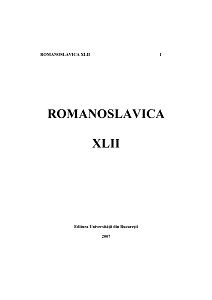Eterogenitate şi paradox în literatura rusă de avangardă
Heterogeneity and paradox in Russian avant-garde literature
Author(s): Camelia DinuSubject(s): Cultural history, Political history, Russian Literature, Theory of Literature, Sociology of Literature
Published by: Editura Universităţii din Bucureşti
Keywords: Heterogeneity; paradox; Russian avant-garde literature;
Summary/Abstract: The Russian avant-garde was a dynamic phenomenon, effervescent and heteroclite, both from a theoretic and practical point of view. It became one with the European avant-garde, assimilating its influences, but in the same time it managed to maintain its identity and it also added some original aspects to the universal avant-garde phenomenon. In this study I examine the Russian avant-garde as a complicated social and cultural movement with many conflicting programs. Rather than focusing primarily on the ideas of the leadership, I investigate its heterogeneous social composition and its varied cultural practices. I try to show the complex interaction between official pronouncements and their implementation. The discussion of Russian modernism can overlook neither groups, organizations and movements such as „Serapion’s Brothers”, OPOIAZ, OBERIU, Constructivism, Expressionism, LEF, „Nicevoki”, „Pereval”, „Proletkult”, RAAP. This study is a synthesis of the ideological frame of these groups, the doctrinaire ideas from the manifestos, the fundamental esthetic features, the balance between tradition and innovation, the contribution to the metamorphoses of the literary modern language. Russian modernism had a paradoxical and dramatic evolution, determined by the contrast between the artist’s thirst for freedom and the politicians’ pragmatic orientations.
Journal: Romanoslavica
- Issue Year: XLII/2007
- Issue No: 1
- Page Range: 35-52
- Page Count: 18
- Language: Romanian

